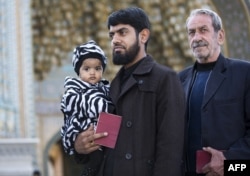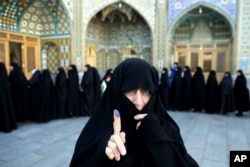Iran continues to count votes Sunday from its parliamentary election, with final results in most races expected Monday.
Partial results indicate major gains for reformists and moderates who favor engagement with the West.
President Hassan Rouhani and former president Akbar Hashemi Rafsanjani are also leading the race for membership in the Assembly of Experts. The influential body monitors the work of Supreme Leader Ayatollah Ali Khamenei, who has final say on Iran's foreign policy, and could choose the next supreme leader.
Partial results point to hardliners losing ground in the 290-seat legislature. For Tehran's 30 seats, initial results released by the government showed at least 26 reformists among the front-runners.
Iran's official media on Saturday quoted Rouhani as saying the election has given the government more credibility and clout.
"The competition is over. It's time to open a new chapter in Iran's economic development based on domestic abilities and international opportunities," the official IRNA news agency reported him as saying.
Election test of nuclear deal
The vote was the first election since the country's nuclear deal with world powers took effect.
The final results may provide the first clue as to whether key Western proponents of the deal will receive what they hoped for; a more open, moderate Iran.
The outcome could be interpreted as a comment on the level of support for the policies of Rouhani, who is up for re-election next year. Rouhani has made the nuclear agreement a key objective of his administration.
Voting for future
Iranian State TV called Friday a “great day for the nation,” as citizens across the country turned out to vote for the country's parliament and the Guardian Council, which selects Iran's Supreme Leader.
State TV showed voters across Iran giving their reasons for their choices. A man with a young child said he was “voting for his children's future,” while an older woman said she wanted to “foil Iran's enemies, who are plotting against the country.”
A correspondent for Iran's Al Alam TV at a major Tehran polling station said turnout was “beyond expectations,” and that “long lines of voters had shown up,” to “express their support for their country and its Islamic system.”
Political analyst Mohamed Ali Mirzani told the TV Iranian electors like to vote at odds to the way foreign countries want them to vote in order to quash threats posed from abroad. He said voters know their participation is important in deciding the fate of their country.
Large turnout
Newspapers reported a huge turnout at the polls Friday, including many young voters.
Polls had been scheduled to close at 6:00 p.m., but remained open much later in some cases. State television showed long lines both in Tehran and in polling places around the country.
Some 55 million Iranians were registered to cast ballots for members of the conservative-dominated 290-seat parliament as well as the 88-member Assembly of Experts.











